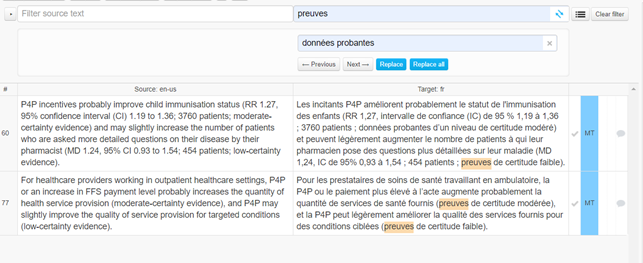The Memsource web editor is divided in three different sections:
- Main editing section
- Preview section
Panes section
1.Main editing section:
The main editor section contains the menu bar on top, the quick access toolbar, and the bilingual document divided into segments.
The menu bar and the different commands in it are described in detail in Memsource's help page.
The quick access toolbar includes the following commands:
| Bold format | There is no need to use these formatting tools, since the format of the original document will be provided with tags. | |
| Italic format | ||
| Underlined format | ||
| Subscript format | ||
| Superscript format | ||
| Undo/Redo | Undo/redo last action | |
| Confirm segment | Confirms segment as translated and saves it into TM. | |
| Split segment | Splits a segment in two, the cursor has to be in the source segment to split | |
| Join segments | Joins the selected segment with the segment below | |
| Delete text | Deletes the text in the selected segment | |
| Copy | Copies text in the source segment to the target segment | |
| Insert Tag | Insert tags; when inserting {1>paired tags<1}, first select the text to get enclosed in tags and only then hit the Insert Tag command. In this way both tags will be inserted at once around the selected text. | |
| Display hidden characters | Toggle to display hidden characters (such as space, non-break space, new line) | |
| Overwrite mode | Enables overwrite mode (not currently supported for Chinese, Japanese and Korean) |
The bilingual document includes a filter bar where you can filter either the source or the target columns by content typing the text into the field. You can also filter by other criteria by clicking on the left-hand side arrow (see image below). You can then filter by segment status, pretranslated form, who created/modified/commented on the segment, and you can sort them by first letter, length and repetitions. More information about filtering and sorting.
The bar at the top of the editing window can be used to search and replace terms. Type the term that you want to search for and click on the arrows to display the 'replace' field. Type the new term in this field and click on Replace or Replace all to replace all occurrences in the text.
Under the filters the actual document displays in segments (rows), and includes seven columns corresponding from left to right to:
- source text
- target text (here is where the translation is entered)
- Segment status: meaning not confirmed (the translation has not been imported to the Translation Memory), meaning confirmed, and meaning confirmed on the translation step but not on the editing step.
- Translation Memory match / Machine translation / Term base: the colour of the cell is related to the matching and the number indicates the proportion (eg. means there is 101% match with the translation memory, means 99% match). This column also shows when the text has been machine-translated . Recommended terms from the term base (glossary) are marked with .
- Next column shows whether the segment is repeated throughout the job .
- Next column shows if the segment has been locked
- Last column shows if there are comments on the segment. The symbol displays in grey when there is no comments () and in blue when there are comments on that segment . To add/read a comment you just have to click on the symbol.
2. Preview section
The preview section shows a preview of the source text or the target text, and displays right below the main editing section. You can select to see the preview of the source text, the preview of the translation, or hide the preview from the menu bar (go to Tools>Preview; see image below).
3. Panes section
The panes section displays on the right-hand side of the editor and includes four panes: CAT, Search, QA, and Changes. You can navigate from one to the other by clicking on the corresponding tab at the bottom of the section.
The CAT pane displays matches from translation memory, term base, machine translation and non-translatable matches for each segment. To select one of the options just double-click on it.
The Search pane displays the results for search queries from the translation memory and the term base. The search can be launched by selecting some text in the source or target and hitting: Ctrl+K for a fuzzy search, Ctrl+Shift+K for an exact search.
The QA pane displays quality assurance warnings for segments with problems, as identified by QA. It is recommended to run the QA in the Editor before marking a job as ‘Completed’ on the Dashboard to make sure there are no problems (especially tag misplaced).
You may (de)select any of the QA checks by clicking on the arrow to the right of the 'Run' button (see image below) to display the list and clicking on the corresponding boxes.
The Change pane displays changes in a segment across all workflow steps (T: translation; E: editing; FR: final review) (see image below). If no changes are available, the Changes pane will be blank.
Click here for more information on the panes section.
